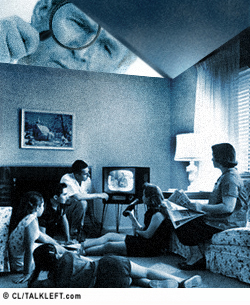Weighing in for the first time on the controversy, he said in an interview that the commission was never told of the operation and that he has strong doubts about whether it is authorized under the law.
Federal law under the Foreign Intelligence Surveillance Act, created in 1978, "gives very broad powers to the president and, except in very rare circumstances, in my view ought to be used," said Mr. Kean, a Republican and former governor of New Jersey. "We live by a system of checks and balances, and I think we ought to continue to live by a system of checks and balances."
The Washington Post has more here.
The 44-page report said that Bush probably cannot claim the broad presidential powers he has relied upon as authority to order the secret monitoring of calls made by U.S. citizens since the fall of 2001. Congress expressly intended for the government to seek warrants from a special Foreign Intelligence Surveillance Court before engaging in such surveillance when it passed legislation creating the court in 1978, the CRS report said.
The report also concluded that Bush's assertion that Congress authorized such eavesdropping to detect and fight terrorists does not appear to be supported by the special resolution that Congress approved after the Sept. 11, 2001, terrorist attacks, which focused on authorizing the president to use military force.
"It appears unlikely that a court would hold that Congress has expressly or impliedly authorized the NSA electronic surveillance operations here," the authors of the CRS report wrote. The administration's legal justification "does not seem to be . . . well-grounded," they said.
CRS does not make its reports available to the public, but members of Congress are free to publish them on their own sites.
With its $80 million budget and 800 employees, it issues about 3,000 briefs, reports, short issue papers and longer position papers per year.
An arm of the Library of Congress, the Congressional Research Service is renowned for its non-partisanship and in-depth analysis, but it does not make its reports available to the public. However, it cannot prevent members of Congress from giving them out individually and some government agencies from posting reports they find relevant. Perhaps 1000 have become available on the web.
[Graphic exclusive to TalkLeft.]




